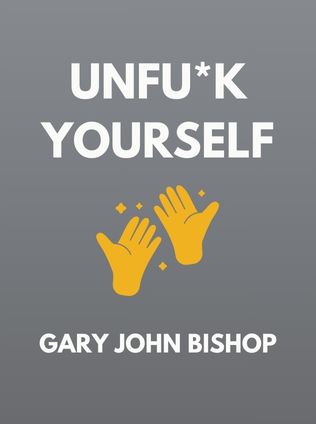
Unfu*k Yourself
Get Out of Your Head and Into Your Life
By Gary John Bishop
Published 10/2016
About the Author
Gary John Bishop is a transformative figure in the realm of self-help, renowned for his unapologetic and direct approach to personal development. Born and raised in Scotland, Bishop's journey from a background in philosophy to becoming a leading life coach and personal development expert has been marked by his commitment to making self-improvement accessible to everyone. His philosophy is rooted in the belief that personal growth is not reserved for the elite or the exceptionally gifted but is something that everyone can achieve by taking control of their thoughts and actions.
Bishop's work, including Unfu*k Yourself, is characterized by its straightforwardness and practicality. He doesn’t sugarcoat the challenges of self-improvement but instead offers tools that are as effective as they are simple. His method strips away the complexities often associated with self-help, focusing instead on actionable steps that anyone can implement. This approach has resonated with a broad audience, leading to the widespread success of his books and speaking engagements.
With Unfu*k Yourself, Bishop cements his place alongside other influential self-help authors like Mark Manson and Jen Sincero, who similarly utilize a blend of humor, candor, and actionable advice to empower their readers. Bishop's contribution to the genre is his ability to cut through the noise, offering a no-nonsense guide to overcoming self-imposed limitations and living a life of purpose and fulfillment.
Main Idea
At its core, Unfu*k Yourself is a call to action for anyone who feels stuck, frustrated, or powerless. Bishop's central thesis is that the way we think determines our reality. He argues that our thoughts have the power to either propel us forward or keep us trapped in a cycle of negativity and inaction. The book introduces seven power statements designed to help readers take control of their self-talk, challenge their limiting beliefs, and cultivate a mindset that fosters success and happiness.
Bishop's message is clear: by changing the way we talk to ourselves, we can change our lives. This transformation begins with a willingness to confront our negative thoughts and replace them with empowering beliefs that align with our goals. The book is not just about thinking positively but about taking concrete steps to rewire our brains for success. Through these power statements, Bishop offers a practical roadmap for breaking free from the mental patterns that hold us back and achieving the life we truly desire.
Table of Contents
- Introduction
- Take Control of Your Self-Talk
- Uncover Your Deepest Beliefs
- Step 1: Stop Holding Yourself Back
- Step 2: Ensure Your Success
- Conclusion
Introduction
The introduction to Unfu*k Yourself sets the stage for the journey Bishop invites the reader to embark on. He begins by addressing the universal experience of feeling stuck—whether in a job, a relationship, or simply in life itself. These feelings of frustration and helplessness, he argues, often stem from the stories we tell ourselves. These internal narratives shape our perceptions and dictate our actions, ultimately determining the course of our lives.
Bishop's goal is to help readers dismantle these harmful narratives and replace them with empowering self-talk that drives positive action. He introduces the concept of "assertive self-talk," a proactive approach to internal dialogue that challenges negative thoughts and replaces them with affirmations of capability and potential. This shift from passive to active self-talk is the foundation upon which the rest of the book is built.
Take Control of Your Self-Talk
Bishop begins his exploration of self-talk by explaining its immense power over our lives. Self-talk is the internal dialogue that runs constantly in our minds, influencing our emotions, behaviors, and overall outlook on life. While we often think of self-talk as a natural and automatic process, Bishop emphasizes that it is within our control. By becoming aware of the negative narratives we subconsciously repeat, we can begin to reshape our thoughts in ways that support our goals and well-being.
Most of us, Bishop suggests, are trapped in "narrative mode," where our self-talk is passive and often negative. This mode is characterized by a continuous internal commentary that frames our experiences in limiting and self-defeating ways. For example, after a setback at work, you might find yourself thinking, "I always fail at everything. I'm just not good enough." This kind of narrative self-talk reinforces feelings of inadequacy and hopelessness, making it harder to recover from challenges and move forward.
In contrast, Bishop advocates for "assertive self-talk," a proactive approach where you consciously choose the messages you send to yourself. Assertive self-talk involves recognizing negative thoughts as they arise and replacing them with affirmations that are aligned with your goals and values. Instead of passively accepting the thought, "I always fail," you might assertively tell yourself, "This is just one setback, and I have the skills to overcome it."
This shift from narrative to assertive self-talk is not just a matter of semantics—it has profound implications for how we experience and respond to life’s challenges. By actively choosing empowering thoughts, we can change the way we perceive obstacles, transforming them from insurmountable barriers into opportunities for growth and learning.
Sign up for FREE and get access to 1,400+ books summaries.
You May Also Like
The Subtle Art of Not Giving a F*ck
A Counterintuitive Approach to Living a Good Life
By Mark MansonRich Dad Poor Dad
What the Rich Teach Their Kids About Money - That the Poor and Middle Class Do Not!
By Robert T. KiyosakiHow To Win Friends and Influence People
The All-Time Classic Manual Of People Skills
By Dale CarnegieFreakonomics
A Rogue Economist Explores the Hidden Side of Everything
By Steven D. Levitt and Stephen J. Dubner



















